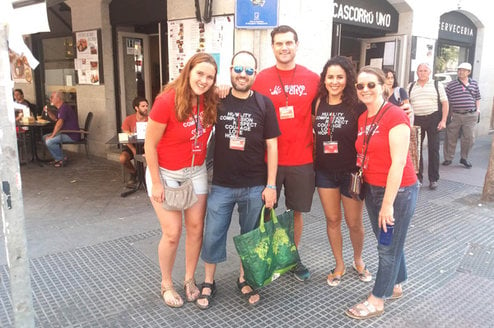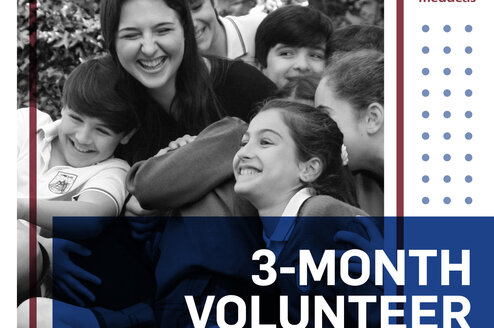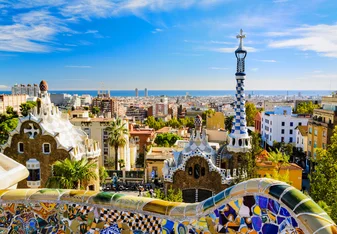Volunteer in Madrid, Spain
Volunteer Programs in Madrid
About
Madrid is a sophisticated city, rich in culture and history. As the capital of Spain, it also acts as the economic and political core of a country with some of the world’s most important ties to Latin America.
Thanks to the movida madrileña and other steps that were taken towards modernity after the death of dictator Franco in 1975, Madrid emerged as a modern capital, measuring up to other metropolis worldwide. However, while there have certainly been improvements in the standard of living in Madrid in the last decades, life isn’t always rosy. Especially due to the recent economic crisis, there are high unemployment rates.
As a result, volunteers are more welcome than ever in Madrid. With a strong need for English teachers, Madrid presents a unique opportunities for volunteers who are interested in educating both adults and children. Similarly, those interested in helping out with disadvantaged minority groups, including women, immigrants, disabled people and mentally ill, will find numerous options here in Madrid. It’s a unique chance to help out, and in your free time, you can revel in the splendor of the Spanish capital, including mouth-watering tapas on the terrazas, late nights in the bares, a soccer match in the Estadio Bernabeu or a full day at the Prado Museum. Read on to find out how you, too, can become a part of it!
Program Types
Madrid is an international destination that still retains many of its Spanish traditions. While more Spaniards speak English than a decade ago, there are many more who want to learn. This is where volunteers come in… as English teachers. Teaching English is one of the most popular volunteer opportunities you will find in Madrid, such as through Pueblo Inglés or Vaughan Town. If you already speak some Spanish, in turn, you can also consider helping out at a women’s shelter, an elderly people’s home, or at a facility for disabled people. There are always people in need of help, you just need to go out and find them.
Health
Volunteers who are interested in social and/or medical work will find numerous opportunities to use these skills in Madrid. The Spanish capital is home to large hospitals, as well as NGOs that focus on improving the health of the citizens. La Cruz Roja (Spanish Red Cross) offers various options, such as helping hospitalized children or restoring a deforested area. If you prefer to provide assistance from a distance, you can sign up for the tele-assistance program and answer calls. Note that speaking Spanish and/or having social work experience will be required for some of these positions.
Community Development
Every day, new immigrants arrive at Barajas international airport without residency and/or work permits, and without speaking the language. In many cases, they are sent back to their home countries, but sometimes they aren’t. If the authorities allow them to stay in Madrid, they often need help adapting to the Spanish lifestyle, which includes finding a place to stay and learning to speak the language. Madrid has numerous organizations committed to assisting immigrants and other disadvantaged minorities. As a volunteer, you could find yourself teaching children as well as adults, or helping out with other administrative duties. Depending on the origin of the immigrants, additional language skills will be useful (e.g. French if working with Moroccan immigrants).
Environmental Conservation
If you’re interested in environmental and/or marine conservation projects, it is best you head to the Spanish coast or the islands. If you’re interested in learning more about wines, you can also volunteer at a winery. Madrid can be your starting point to head out further to rural and coastal areas.
Youth Development and Education
Madrid is an ideal place to work with children. You can opt to live with a family full-time as an au pair, which allows you to save on accommodation costs. If you prefer a little more independence, consider teaching English at a bilingual school, or assisting children with homework after school. Should you enjoy working with younger children, you can help out at a childcare center, too.
Gender Equality
Despite the recent trends in female emancipation, in general, women still hold a lower status in Spain than men. Madrid offers volunteers the chance to make a difference by working at a women’s shelter, for example. However, the importance of coming prepared for this type of volunteer work can’t be stressed enough. Domestic violence isn’t always easy to deal with, and you should educate yourself before you start to determine whether this is really the place you want to volunteer. If you have counseling, nursing and/or paralegal experience, be sure to highlight that when you apply.
Planning Your Trip
Volunteering Tips
As mentioned before, Madrid is an international destination, but it still retains many of its Spanish traditions. You’ll find large commercial streets and malls that carry international brands, as well as local specialties. While you’re in Madrid, take advantage of the latter to explore and discover what is unique about the Spanish capital.
Throughout Spain, you’ll find that food and family is very important. Particularly on a Sunday, families come together to have a long (and delicious!) lunch. Living with a host family will highlight this tradition, and perhaps you will even be invited to a family celebration. Note that eating food “on the go” is not always appreciated by the Spaniards. Vegetarians, too, might have a hard time. If food is included in your program, be sure to indicate any dietary requirements prior to arrival.
Also, volunteers in Madrid should be especially aware of pickpockets in touristy areas (around the Puerta del Sol, for example) and on the metro (subway). Keep your eye on your belongings and especially at night, use your common sense to prevent street crime. Speaking English in a loud and obnoxious manner will get the attention of possible muggers, so be sure to avoid it. Also, try not to walk around alone at night and instead go out with a group.
Volunteer Support: Volunteer programs usually have a support system. Find out beforehand whether you have access to advisors 24/7. And while you’re at it, inquire about emergency situations, including medical ones.
NGO/Nonprofit/Volunteer History: Madrid is home to numerous NGOs, which used to receive quite substantial subsidizing from the Spanish government. With the recent economic crisis, however, this is unfortunately not the case anymore. Click here for a complete list of NGOs in Spain from WANGO.
Know Before You Go: Find out whether your volunteer placement will require you to speak Spanish. Also, if you’re interested in teaching English, inquire whether you’ll need a TEFL certificate or other qualification in order to apply. Plan ahead and everything should go smoothly.
How Volunteering Here Will Help Your Future: There are numerous volunteers who decide to stay in Madrid after their initial placement has ended. Their volunteer work gives them a step in the door to further work opportunities down the road. No matter where you want to work, volunteer experience can come in handy. Highlight it on your resume, especially if you’re interest in working in international relations.
How to Save Money While Volunteering: Madrid is a sophisticated city, and at first sight, very expensive. Still, there are ways to save. If you plan on eating out, consider ordering a menu del día. Should you want to see an exhibition, check out whether there is a day that the venue is open for free. You can also use a student ID to get discounts at many places. Check out Madrid Free or MADbudget, two guides that will allow you to make the best of Madrid on a budget.
Best Places To Volunteer: Finding a placement that works for you will depend on your individual goals. Think about whether you want to work with children, adults, disadvantaged minorities, or the environment. After you’ve conducted some research, ask questions and choose the placement that best matches your goals and interests.
Questions to Ask: Where am I going to live (homestay, apartment, student residence)? What are my goals? Do I want (or need) to speak Spanish? What other qualifications are required for my volunteer placement? Am I going to use public transport? Does my housing include food? If not, will I have access to a kitchen? What other services and/or amenities are included in my volunteer placement?
Health and Safety of Volunteers in Madrid
Travel to Madrid generally doesn’t require any particular immunizations and/or medications. Experts do, however, recommend a Hepatitis B shot for all travelers. Should you plan to visit rural areas, consider getting a Hepatitis A vaccine, too. If you were born after 1956, it is recommended that you get two doses of MMR vaccinations. Every 10 years, you should also get a Tetanus-diphtheria shot and if you’re visiting during the winter (November-April), the flu shot is recommended, too. Check out MD Travel Health for more information.
Visas for Volunteering in Madrid
If your stay is less than 90 days, you won’t need a visa to travel to Spain as a U.S. citizen. Should you be arriving in Madrid via a connecting flight, check whether you need a visa for that destination. For more information on visas, check Visa HQ for more details.
Contributed by Isabel Eva Bohrer













